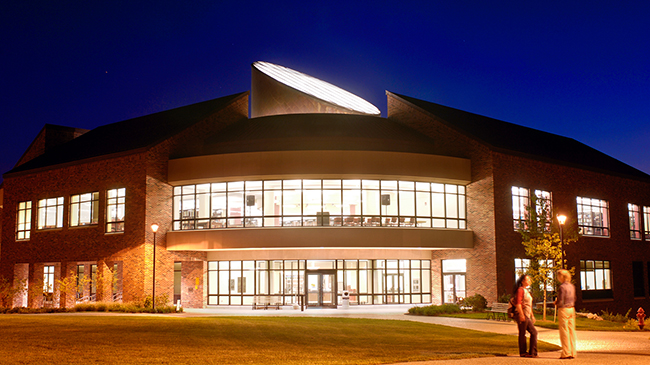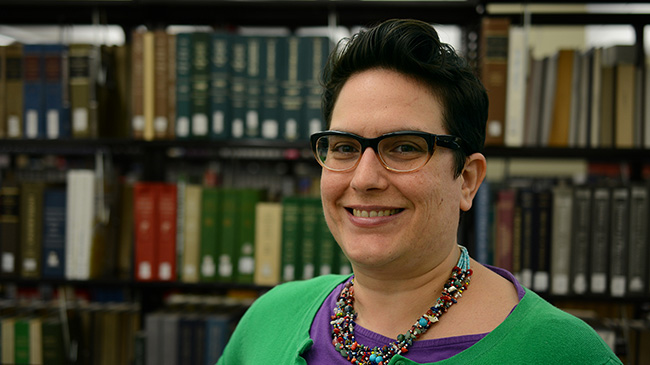
What is a library?
Is it merely a static building that contains books, journals and other research materials organized by subject, author and title?
Until recently, that definition might have been the prevailing wisdom, especially in non-academic settings. Today, not so much.
Today’s academic library increasingly understands itself as an active participant in the teaching and learning mission of the university. It’s a space where students come, not to find ready-made solutions to problems they have been assigned, but to deepen their understanding of what it means to access, evaluate and create information. The old university library might have been content to provide answers. The new library seeks to stimulate conversations.
Many of these conversations begin in the library instruction program. At IU Southeast, library instruction is integrated into the first year experience and the curriculum of many departments. It provides a variety of student-centered classes and workshops that help students get to know how to effectively use the library and its many research tools.
Maria Accardi is associate librarian, coordinator of instruction and reference, and the 2015 Chancellor’s Award recipient for diversity in scholarship. As co-editor of Critical Library Instruction (2010), an influential book on progressive theories and methods in information literacy, and the author of Feminist Pedagogy for Library Instruction (2013), Accardi is a leading voice in the movement to re-imagine and reinvigorate the academic library as an engine of teaching and learning. This past week, she delivered the keynote speech to the college and research division of the Pennsylvania Library Association’s annual conference in State College, Pa.
As coordinator of instruction, Accardi schedules classes and assigns librarians to teach them. But beyond providing these services, she generates a vision for the program that focuses on several core questions: How can librarians contribute to student success? How can librarians stay current with trends in the profession and translate them into practice for the benefit of students? Is the vision of the library academically sound?
“For starters, there are better tools than Google,” Accardi says. “The most fundamental contribution the library can make to student success is to teach information literacy.”

Maria Accardi, IU Southeast associate librarian and coordinator of library instruction, is helping to redefine the library as an engine of teaching and learning.
The Association of College & Research Libraries (ACRL) officially defines information literacy as “a spectrum of abilities, practices and habits of mind” that help students understand essential concepts, engage in critical reflection, create new knowledge and “adopt a strategic view of the interests, biases and assumptions present in the information ecosystem.”
It is an approach teaches students not just how to find information — and yes, there is more than Google — but also how to evaluate it and put it to use. This is especially critical in an age of multiplying media platforms in which the line between creator and consumer is blurred, bent and refracted, and students need new tools to navigate sources, critically assess points of view and responsibly manage their use of information.
Today’s library does not understand itself as omniscient or nonpartisan. It is a full-fledged participant in the debates that enliven all other academic areas. It is a forum for advocacy, persuasion, reflection, choice. Students are encouraged to view academic authority as a construct, and to approach it with an attitude of “informed skepticism and an openness to new perspectives, additional voices and changes in schools of thought” (ACRL).
This extends to their own librarians.
“Librarians are people, too,” says Accardi, noting that these members of faculty bring their own biases, points of view and agendas to their work. The overall purpose of critical library instruction is to make these aspects more apparent, and thus to reveal the library itself as a real place, rather than a hushed and hallowed escape from reality.
Bringing this human element into the library can make the interaction with students more open, collaborative and egalitarian. “The librarian is no longer the ‘sage on the stage,'” Accardi says, “but a ‘guide on the side'” — bringing qualities such as listening, respect, empathy, caring and informed trust to the student-librarian relationship.
For Accardi, feminist pedagogy can transform the everyday library experience by further humanizing the environment and the interactions that take place within it. The library can become a place of consciousness-raising and social change where student knowledge and experiences are validated, collaborative learning is practiced and the traditional imbalance of power between teacher and learner is overcome.
For her unique application of feminist theory to the mission and work of the library, Accardi was awarded the 2014 ACRL Women and Gender Studies Section Significant Achievement Award.
By helping students understand that the library status quo is itself a construct, new approaches such as information literacy, critical theory and feminist pedagogy help empower them to take control of their own learning journeys, enriching their university experience and building discernment and critical thinking skills that serve them well beyond graduation.
“These are transferable skills that are useful in any career,” Accardi says.


